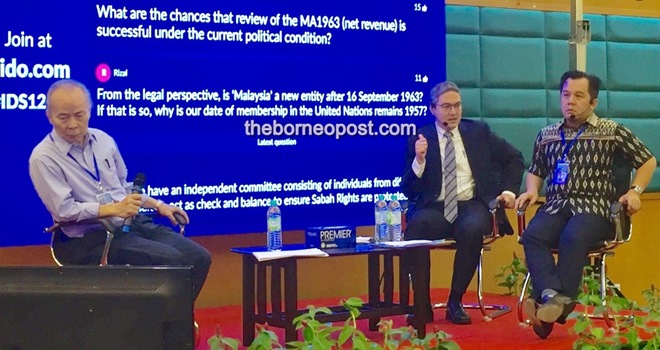
Su Guanshan said that : if the federal government cannot fully implement the 1963 Malaysian Agreement (MA63), the state government can choose to take legal action against the federal government. However, he also said that the prosecution of the federal government can only be a "final means", that is, the state government has taken all feasible measures, but the federal government is still unable to fulfill the 1963 Malaysian contract. He said that according to his detailed reading of the 1963 Malaysian Compact, Article 8 of the document states that Sabah and Sarawak can take all feasible actions to ensure the Inter-Governmental Committee between the 1963 Malaysian .......
Su Guanshan: If the Federation is unable to implement the MA63 Sabah and Sarwak government has the right to sue the Federation
March 12, 2019
(From left) Chairman of the Sabah Development Research Council Tan Sri Sai Men Xi Leopard, Chairman of the Sabah Law Association Su Guanshan, and Cameroon State Councilor KPMG, discuss the 1963 Malaysian Compact.
Kota Kinabalu 12th News |
Su Guanshan, president of the Sabah Law Association, said that if the federal government cannot fully implement the 1963 Malaysian Agreement (MA63), the Sabah and Sarawak government has the right to sue the Federation
However, he also said that the prosecution of the federal government can only be a "final means", that is, the state government has taken all feasible measures, but the federal government is still unable to fulfill the 1963 Malaysian contract.
He said that according to his detailed reading of the 1963 Malaysian Compact, Article 8 of the document states that Sabah and Sarawak can take all feasible actions to ensure the Inter-Governmental Committee between the 1963 Malaysian Compact. The agreement was implemented.
"Of course, I am not encouraging the two states to take legal action immediately. But we must consider what the future agreement can't do. If the parties to the agreement negotiate with each other, discuss, and talk, there is still no result. The last way is only through the court's ruling."
Su Guanshan said this morning at a 1963 Malaysian Compact Forum organized by the Sabah Development Research Bureau (IDS). He believes that the court has the power to hear disputes between the federal government and the state government, because in the past, the government of Kelantan and Terengganu had brought disputes with the federal government to the court.
"Re-emphasizing that this can only be the ultimate means. In fact, I am not in favor of the state and the federal government, and must go to the point of legal proceedings. The national judicial department has the responsibility to clarify the Malaysian contract and is responsible for explaining and clarifying this. In the case of national special rights and income agreements, the definition of each provision is exempt from any dispute."
Those who attended the forum asked if Sabah Lawyers would stand behind the state government and support the state government if the dispute was really going to be brought to the court in the future. Su Guanshan said that the purpose of the lawyers’ association was to assist the government when necessary. In order to uphold the principle of justice, and not to worry about partiality.
"There is a term in the legal profession called Amicus Curiae, a friend of the court. It is not a party to the lawsuit. It only provides legal advice. The Malaysian contract is a subject that affects the public interest. If one day it is going to go to court, then the Sabah Bar Association will not The hesitant application became the Amicus Curiae of the case."
In addition, he also reminded that the most important thing at the moment is that everyone must understand the government's project on the Malaysian contract. At the end of last year, a steering committee has been set up, and members of the committee have begun to meet. If there is no other way to solve the problems in the agreement, especially the issue of income in Sabah and the special power issue in Sabah, he believes that it is good to hand over the work to the committee and not affect their work.
"The committee should have enough room to perform their duties so that the public can see if there is any consensus or agreement on Sabah and Sarawak after the discussion. The better the public understands the rights of Sabah and Sarawak, because more People understand that the public opinion can bring more influence. If it can, the public should also express their opinions through their people's representative."
The forum was hosted by the Chairman of the Sabah Development Research Bureau, Tan Sri Saimen Xibao. The forum was given by Su Guanshan, as well as Jin Mawan State Councilor Jamawei Jiahua. The forum discussion items included various relevant views of the 1963 Malaysian Compact, including: political views, state income rights and special rights, MA63 history, challenges, solutions, legal remedies, etc.
Participants in the forum included NGO leaders, government representatives, lawyers, high school students, and related departments.









